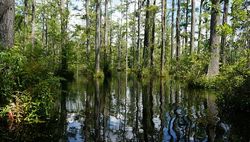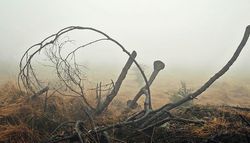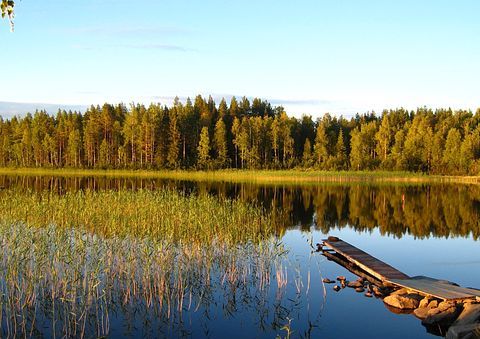You are my forgotten edge,
You are my native land!
Blue boards of heaven.
You are my forgotten edge,
You are my native land.
help make an analysis of Yesenin's verse "Swamps and swamps"
Swamps and swamps
Blue boards of heaven.
Coniferous gilding
The forest is ringing.
Tit tit
Between forest curls,
Dark firs dream
The hubbub of mowers.
Through the meadow with a creak
The convoy is stretching -
Dryish linden
Smells like wheels.
Willows are listening
Wind whistle.
You are my forgotten edge,
You are my native land.
Sergei Alexandrovich Yesenin is often called the singer of Russian nature. There is no such state of the surrounding world that the artist would not sing subtly and poetically. His poetry reveals the secrets of nature in a peculiar and sublime way, perhaps that is why personification was his favorite artistic device.
In the poet's verses, trees, grasses, still waters all live and breathe with their unique and magical charm. You can select a large number of color images, an abundance of sounds, smells. At the beginning of creativity, the surrounding world is full of harmony and colors.
Swamps and swamps
Blue boards of heaven.
Coniferous gilding
The forest is ringing...
When perceiving Yesenin's poems, hearing, sight, smell, taste are involved.
The poet conveys his state of mind through pictures of nature.
The world created by the creator is perceived by the poet as ideal, devoid of any flaws. In the early lyrics, Yesenin often uses Church Slavonic vocabulary. It seems to unite the earth and the sky, and nature is the crown of their creation. The author's favorite technique is personification. He refers to trees and grasses, rivers and lakes, steppes and fields as close friends, including them in his confidential conversation. Hence the special affinity of the poet with the surrounding world, a complete merging with nature, to which the author constantly strives. If there is no this harmony, the poet experiences melancholy, sadness, discomfort. His friend nature is sensitive to the state of the author, or vice versa. Yesenin perfectly sees the mood of the world around him, he knows how to sensitively convey it in colors.
The beautiful, bright, sonorous and multi-colored lyrics of Sergei Yesenin are filled with high patriotism. Whatever the poet writes about, it's all about Russia. She appears to the author either as a tender birch girl, or as a blue who has fallen into the river, or meek and serene, or restless and proud, but always infinitely loved.
Willows are listening
Wind whistle…
You are my forgotten edge,
You are my native land.
Surprisingly tender, melodious and colorful Yesenin's poetry leaves an indelible mark on the reader's soul, teaches to be a devoted, selfless and faithful son of the great and long-suffering country of Russia.
Kostya Ananiev Student (169) 10 months ago
Swamps and swamps
Blue boards of heaven.
Coniferous gilding
The forest is ringing.
Tit tit
Between forest curls,
Dark firs dream
The hubbub of mowers.
Through the meadow with a creak
The convoy is stretching -
Dryish linden
Smells like wheels.
Willows are listening
Wind whistle.
You are my forgotten edge,
You are my native land.
Sofia Cat Student (132) 1 month ago
S. A. Yesenin called himself "the last poet of the village." He loved the Russian countryside, rural labor, nature. Nature was a stimulus for creativity for the poet, so most of the lyrical works of Sergei Alexandrovich are dedicated to his native land, beautiful Russian expanses.
The main theme of the poem "Swamps and swamps" is love for the native land. The poet called his small homeland the village of Konstantinovo, where he was born and raised, where he spent his youthful years, where the future poet of Russia grew up and formed. The key words of this work can be called the last lines, which summarized the artistic picture created by Yesenin:
You are my forgotten edge,
You are my native land!
The poet describes the nature of central Russia: swamps and swamps, blue skies, coniferous green forests. Nature is full of life, harmonious, and the lyrical hero revels in the landscape that opens before him. To convey the delight of the lyrical hero, the author uses metaphors, personifications: “the blue board of heaven”, “coniferous gilding”, “between forest curls”, “dark firs dream”, “wind whistle”. The poem is rich in figurative folk expressions that make the lyrical work as clear as possible to the reader: “clothes of heaven”, “tit tit”, “the hubbub of mowers”, “listening to the willows”. The reader hears how “a forest is ringing with coniferous gilding”, “a convoy stretches across the meadow with a creak”, “a wind whistle”; sees swamps, swamps, blue sky overhead, a small convoy; smells of pine needles, as "the smell of dry linden from the wheels." The native side is beautiful, and although the poet does not have here a description of the endless expanses, vast seas, impenetrable forests, but there is the most precious thing - signs of the native land.
It is in the work of S. A. Yesenin that the theme of the “small” Motherland, native Ryazan, the village of Konstantinov, which gave us the “Russian scandalous piit”, sounds with such force. But for everyone who loves the poems of Sergei Yesenin, the land that he sang in his work is Russia.
Blue boards of heaven.
Yesenin's Russia is fabulous, as in the paintings of Vasnetsov. Before us, as it were, three spaces, three primary colors that create the background of the described picture: green with all its shades, halftones, from dark green to bright emerald green - earth, grass, swamps; fir-trees illuminated by the sun under the wind “ring” with gilding; above all this riot of greenery and gold, the blue sky, like a scarf covering the earth.
Imagine this woman named Rus, dressed in a dark skirt with bushes, twigs, wild berries embroidered along the hem ... She dressed up: her jacket gleams mysteriously. Her head is covered with a bright blue veil that goes so well with her blue eyes. Nature comes to life under the magical touch of the poet, shakes with “forest curls”. She has not yet woken up, only awakens at dawn, but even in a dream the dark firs near the meadow dream of the hubbub of mowers.
Man and nature are so closely intertwined that the line between "natural" and "human" is imperceptible: the sky is compared to a scarf, tree branches - to curls, the wheels of a wagon train traveling through the meadow smell of the linden from which they were made.
Everything is full of sounds and smells: the forest is “ringing”, the tit is “shadowing”, the mowers are “chattering” the fir trees in their sleep, the convoy is stretching “with a creak”, the willows are listening to the whistle of the wind. The ability to hear, to see not only reality, but also dreams, to talk to each other, is endowed in Yesenin's poem with everything living and inanimate.
You are my forgotten edge,
You are my native land.
Native - yes, of course, but forgotten?
Nature in the verses of S. A. Yesenin: analysis of the poem "Swamps and swamps."

Analysis of the poem "Swamps and swamps."
Deep patriotism in Yesenin's poems
In his work, Sergei Yesenin gave the greatest place to his native land, with its beautiful Russian expanses. The poet understood nature, lived by it and sang about it, dedicating most of his lyrical works to it. His poems sound very gentle and sensual, everything lives in them and breathes some kind of magical charm. In the poem “Swamps and Swamps”, Yesenin colorfully and lovingly describes the summer nature of his native land, about which he speaks so reverently: “You are my forgotten land, you are my native land!”. He admires its beauties, the diversity of native nature and the many sounds and aromas that the author skillfully conveys in his works.
The poem "Swamps and swamps" refers to the early lyrics of the poet, where he very sensually and colorfully describes the diversity of his beloved land: "Swamps and swamps, blue boards of heaven." Here Yesenin, describing nature, uses deaf consonants, thereby softening the sound of the text, giving it tenderness and warmth. This technique is used by the author very often to give poetry not only the beauty of the verbal, but also musical. Indeed, his poems convey not only pictures of nature, but also sounds and smells. And so they are very melodic and gentle. “The forest rings with coniferous gilding” - from these lines you can hear the ringing, which is transmitted using the letter “z”.
These lines of the poet describe a fabulous picture, replete with colors of the sky, swamps, needles and all its shades. Here the author combines the earth, nature, and heaven into a single whole. Pictures of his nature are ideal, they are created by the Creator and have no flaw. The author has a special relationship with the outside world, harmony and complete unity. He subtly feels the state of nature, its mood and knows how to very accurately convey in words its colors, smells and sounds.
Yesenin's beautiful lyrics give the reader the pleasure of her beauties: “The willows are listening to the whistle of the windmill. you are my forgotten land, you are my native land. His lyrics are filled with high spiritual patriotism and boundless love for his native land. Yesenin's poems do not leave the reader indifferent, they fill his soul with a song of the beauty of Russian nature.
Composition: Analysis of Yesenin's poem Swamps and swamps

S.A. Yesenin called himself "the last poet of the village." He loved the Russian countryside, rural labor, nature. Nature was a stimulus for creativity for the poet, so most of the lyrical works of Sergei Alexandrovich are dedicated to his native land, beautiful Russian expanses.
The main theme of the poem "Swamps and swamps" is love for the native land. The poet called his small homeland the village of Konstantinovo, where he was born and raised, where he spent his youthful years, where the future poet of Russia grew up and formed. The key words of this work can be called the last lines, which summarized the artistic picture created by Yesenin:
You are my forgotten edge,
You are my native land!
The poet describes the nature of central Russia: swamps and swamps, blue skies, coniferous green forests. Nature is full of life, harmonious, and the lyrical hero revels in the landscape that opens before him. To convey the delight of the lyrical hero, the author uses metaphors, personifications: “the blue board of heaven”, “coniferous gilding”, “between forest curls”, “dark firs dream”, “wind whistle”. The poem is rich in figurative folk expressions that make the lyrical work as clear as possible to the reader: “clothes of heaven”, “tit tit”, “the hubbub of mowers”, “listening to the willows”. The reader hears how “a forest is ringing with coniferous gilding”, “a convoy stretches across the meadow with a creak”, “a wind whistle”; sees swamps, swamps, blue sky overhead, a small convoy; smells of pine needles, as "the smell of dry linden from the wheels." The native side is beautiful, and although the poet does not have here a description of the endless expanses, vast seas, impenetrable forests, but there is the most precious thing - signs of the native land.
It is in the work of S.A. Yesenin, the theme of the “small” Motherland, native Ryazan, the village of Konstantinov, which gave us the “Russian scandalous piit”, sounds with such force. But for everyone who loves the poems of Sergei Yesenin, the land that he sang in his work is Russia.
Blue boards of heaven.
Yesenin's Russia is fabulous, as in the paintings of Vasnetsov. Before us, as it were, three spaces, three primary colors that create the background of the described picture: green with all its shades, halftones, from dark green to bright emerald green - earth, grass, swamps; fir-trees illuminated by the sun under the wind “ring” with gilding; above all this riot of greenery and gold, the blue sky, like a scarf covering the earth.
Imagine this woman named Rus, dressed in a dark skirt with bushes, twigs, wild berries embroidered along the hem ... She dressed up: her jacket gleams mysteriously. Her head is covered with a bright blue veil that goes so well with her blue eyes. Nature comes to life under the magical touch of the poet, shakes with “forest curls”. She has not yet woken up, only awakens at dawn, but even in a dream the dark firs near the meadow dream of the hubbub of mowers.
Man and nature are so closely intertwined that the line between "natural" and "human" is imperceptible: the sky is compared to a scarf, tree branches - to curls, the wheels of a wagon train traveling through the meadow smell of the linden from which they were made.
Everything is full of sounds and smells: the forest is “ringing”, the tit is “shadowing”, the mowers are “chattering” the fir trees in their sleep, the convoy is stretching “with a creak”, the willows are listening to the whistle of the wind. The ability to hear, to see not only reality, but also dreams, to talk to each other, is endowed in Yesenin's poem with everything living and inanimate.
You are my forgotten edge,
You are my native land.
Native - yes, of course, but forgotten? The man who describes his land with such love did not forget it, he kept his native land in his memory and made her see, hear and even feel, feel, as it were, readers.
"Swamps and swamps ..." S. Yesenin
"Swamps and swamps ..." Sergei Yesenin
Swamps and swamps
Blue boards of heaven.
Coniferous gilding
The forest is ringing.
Tit tit
Between forest curls,
Dark firs dream
The hubbub of mowers.
Through the meadow with a creak
The convoy is stretching -
Dryish linden
Smells like wheels.
Willows are listening
Wind whistle…
You are my forgotten edge,
You are my native land.
Analysis of Yesenin's poem "Swamps and swamps"
The landscape lyrics of Sergei Yesenin can be divided into two stages. The first of them falls on 1914 - 1920, when the young poet is trying to find his own style of presentation and understands that his native nature is the source of his inspiration. However, in later poems, Yesenin more and more often criticizes the village, which, after living in the capital, seems to him dirty, dull, joyless and devoid of its former charm. Therefore, it is not surprising that Yesenin writes the most penetrating, pure and exciting poems dedicated to his native places precisely in the first years of his stay in Moscow. He yearns for the village of Konstantinovo, where he spent his childhood, and fondly remembers all those little things that warm his soul in a foreign land.
The poem “Swamps and swamps”, written in 1914 and dedicated to autumn in his native village, which the author depicts very brightly, colorfully and impartially, also belongs to the early period of the poet’s work. The “blue layer of heaven” in this idyllic landscape is adjacent to the “coniferous gilding” of the autumn forest, “the tinkling of tits” and “the hubbub of mowers”. This is a period of calm and tranquility, when field work has already been completed in the villages, and “a convoy stretches creakingly across the meadow”, which is carrying the last harvest to the threshing floor.
Yesenin manages to convey not only the creak of the lime wheels of the cart, but also the smells hovering in the cool autumn air. when dampness mixes with the aroma of mowed meadows, scorched by the hot summer sun, lingonberries and the first mushrooms ripening in the forest. All these smells are so dear and close to the poet that he only needs to close his eyes to mentally transport himself to a world that is so dear, close and understandable to him from childhood. However, Yesenin understands that now he has a completely different life, in which there is no place for rural fun and entertainment. Therefore, with some sadness and longing, the author exclaims: "You are my forgotten land, you are my native land."
Having become a city dweller, Yesenin still remains a rural guy in his soul, for whom there is no more exciting activity than walking along a forest path or inhaling the scent of wild flowers. But the poet understands that he is unlikely to be able to return to his past life, since he has made his life choice. But, saying goodbye to his native places in verse and keeping in mind their amazing beauty, Yesenin is not completely sure whether he really did the right thing, exchanging the rural wilderness, where he left his heart forever, for the brilliance and bustle of noisy Moscow, in which he feels alienated and restless.
Listen to Yesenin's poem Swamps and swamps
Themes of neighboring essays
Picture for the essay analysis of the poem Swamps and swamps








